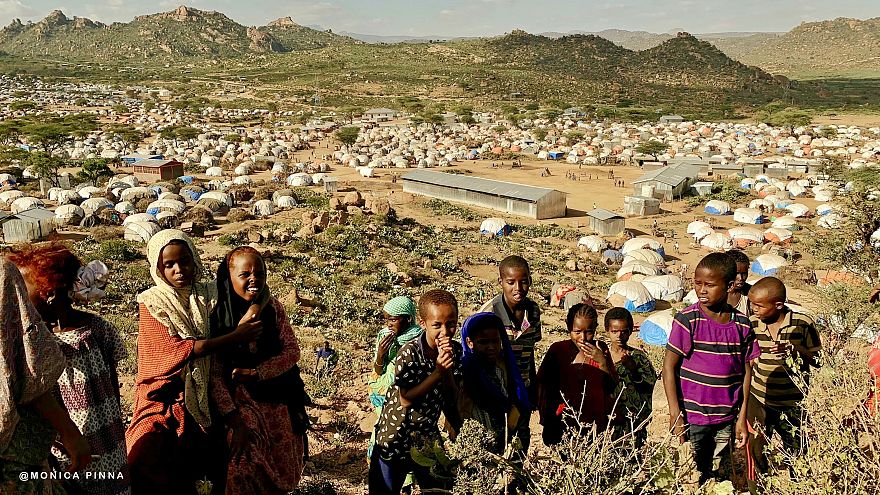Reforms adopted by Ethiopia's new Prime Minster Abiy Ahmed have challenged the status quo – politically and economically. They come as inter-ethnic violence is intensifying throughout the country.
Today almost three million people have been internally displaced. Two-thirds of them have fled the conflict; the others, drought, and floods. Nearly eight million people are in need of emergency food assistance.
Qoloji camp for displaced people
Qoloji is the biggest camp for internally displaced people in the Somali regional state, in the east of Ethiopia. The camp hosts 80,000 people, mostly from the Somali ethnic community and from the nearby Ethiopian Oromia region. New families arrive every day, but many of them have been here for over a year.
Ubah Ali Esse has 5 children and 28 years old are internally displaced.
"I came here one year and three months ago. I had two shops in Oromia, I was selling food and clothes. When we came here, we started living in a little hut, we are suffering a lot."
Hygiene awareness
Water and sanitation are among the most urgent needs in the camp. The United Nation's agency IOM (International Organization for Migration), financed by EU Humanitarian Aid, has built latrines and showers and is working on raising hygiene awareness.
"We have trained 16 hygiene promoters. We've selected them from the IDPs themselves. Each hygiene promoter will train 30 women. They teach prevention and after they finish this session they will follow up the women house to house" Halimo Hassen, IOM
These basic rules save lives. Each week IOM operators go door to door to check how the training is being put into practice. Ubah showed us how she has started separating drinkable from non-drinkable water in the two jerrycans.
Ubah Ali Esse, an internally displaced, speaks about the hygiene awareness training, he has received.
"I have learned to wash my hands properly, especially before I cook. I have learned to wash the dishes, eat while the food is still hot, and then cover the leftovers."
EU Commissioner for Humanitarian Aid and Crisis management
Christos Stylianides, the European Commissioner for Humanitarian Aid visited the Qoloji camp last December. He announced 89 million euros in humanitarian support to be sent in 2018-2019. These funds will be used to address the needs of displaced people, and also to assist one million refugees, as well as to tackle natural disasters.
"We have to focus on specific projects. We insist on this cash and vouchers scheme because for us it is the most efficient way to make these people self-reliant and to give them dignity in these very difficult circumstances. Ethiopia is in a very profound political change and the European Union is here to support these big reforms in this stable island of this region."
Christos Stylianides, the European Commissioner for Humanitarian Aid
There are 600 sites for internally displaced people in Ethiopia. Most of them are not camps. In the village of Deder (Oromia region) where 8,000 displaced people are living, either mixed in with the local population or in administration buildings that have been emptied for use in response to the emergency.
IOM operators collect data from each site every two months to update information on the number of IDPs and their needs using the latest technology. In this administration hall, 200 families have settled over one year and a half ago.
An internally displaced person – Ahmed Osso –warns of inadequate support in spite of increasing numbers.
"Our numbers are increasing; 150 children were born here. We are sleeping on a cement floor; we have no clothes. Our needs are increasing, but what we are receiving is very limited."
The task of understanding the number of internally displaced people, as well as their ages, movements and living conditions is a major responsibility. IOM has deployed a network of operators to collect data which is entered into a so-called “Data Tracking Matrix”.
Communications Officer Dario Poddighe describes the benefits of the store:
"The database contains information about the basic needs of the displaced population, which makes it easier to coordinate the intervention of NGOs and UN agencies, as well as of the government. This translates into providing aid more efficiently."
The government is cooperating with international agencies, who are, nonetheless, asking for an independent assessment of the needs in sensitive areas and to avoid people being pressured into returning to unsafe zones.






